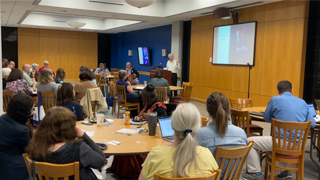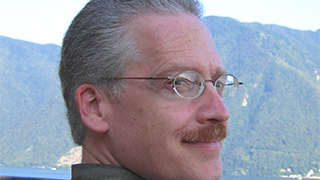Center Hosts 25th Annual Faculty Summer Seminar
Friday, June 30, 2023

Faculty members listening to a presentation during the Summer Seminar.
Over 40 faculty gathered for the 25th Annual Faculty Summer Seminar (May 31 - June 2) hosted by the Center for Catholic Studies and Center for Vocation and Servant Leadership. Faculty members represented various disciplines including communication, psychology, english, Catholic Studies, the University Core, honors, theology, religious studies, biology, physics, music, mathematics and computer science. Such a diverse group provided rich and robust discussion on the topic of science and religion over the seminar’s three days.
This year's seminar was facilitated by Prof. Lawrence Principe, Ph.D., the Drew Professor of the Humanities at Johns Hopkins University in the department of chemistry and the Department of the History of Science and Technology. In addition to his extensive scholarship in both chemistry and the history of science, Principe is the author of two of “The Great Courses,” one on ancient and medieval science and another on science and religion. He is also the Director of the Charles Singleton Center for the Study of Premodern Europe. His research focuses on the medieval and early modern periods, with emphasis on the history of alchemy and chemistry and the science-religion dynamic.

Event speaker Lawrence Principe, Ph.D.
Prof. Principe engaged faculty in discussion on a topic that is often a cause of contention and confusion. Over three days of interdisciplinary lectures touching on history, natural science, philosophy and theology, Principe unpacked the sources, strands and consequences of the “myth of conflict” concerning science and religion. The first day of the seminar was “historiographic,” exploring the origins of the myth of conflict between science and religion, and how and why it has been perpetuated over time. Day two detailed the historical “drama” of what has been referred to as the “Galileo Affair,” highlighting one of the most prominent accounts of apparent conflict between the Church and science. The seminar concluded on day three which looked at this relationship through a philosophical and theological lens, examining the importance of discernment as well as problematic views found in the extremes of religiosity and scientism.
Prof. Nancy Enright, Ph.D., Director of the University Core and professor of english remarked, “The seminar was enriching and enlightening. As someone who knows more about theology than science but finds the latter very interesting, I found the program to be a delight. Prof. Principe’s deep knowledge of religion and how it intersects with the history of science did a lot to undercut some long-standing stereotypes that poise faith and science against each other. His enlightened series of lectures showed how it is more meaningful and accurate to see religion and science as complements to each other, interconnecting in important ways.”
The goal of the summer seminar is to facilitate faculty engagement with diverse threads of the Catholic Intellectual Tradition in the hope that it will enrich their teaching, research, and positively impact the lives of students. Two moments during the seminar illustrated these goals well. It just so happened that Seton Hall professor Prof. Erik Hill, Ph.D., of the Department of Biological Sciences, was able to offer a unique perspective on this year’s seminar speaker. Prof. Hill was asked to introduce Prof. Principe on the second day, where he revealed that both he and his wife had graduated from Johns Hopkins. Although Prof. Hill earned a Bachelor’s Degree in Chemistry from John Hopkins University, he was unable to take Prof. Principe’s chemistry courses due to their high popularity, noting how Prof. Principe was Maryland’s “Professor of the Year.” However, Prof. Hill’s wife was able to take several of Prof. Principe’s courses and received a letter of recommendation from Prof. Principe for graduate school. After graduating from Hopkins, Prof. Hill joined a dot-com startup called Scitutor, where Prof. Principe was the Senior Science Advisor. As part of the introduction, Prof. Hill revealed some of the experiences in their brief time working together, some 20+ years ago. Later that day, he commented that “The whole experience of this seminar reminds you of the serendipity of life.”
Later in the week, during one of the discussions, a participant remarked, “I will
be a better scholar and better teacher for having attended [this seminar].” This year
the summer seminar celebrated its 25th anniversary. The goal then as now is to foster
faculty formation through interdisciplinary dialogue and conversation. The Center
for Catholic Studies and the Center for Vocation and Servant Leadership look forward
to continuing this service for many more years to come.
To view the presentation recordings from the 2023 Faculty Summer Seminar, please click here.
Categories: Faith and Service
